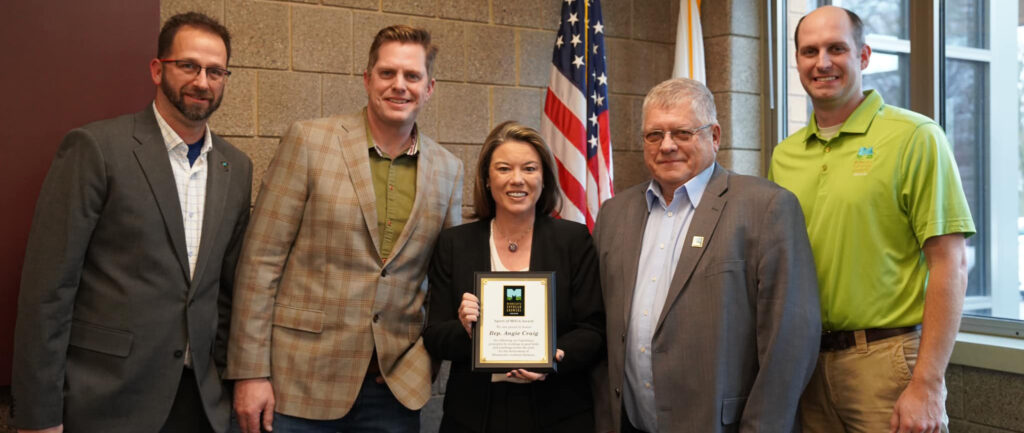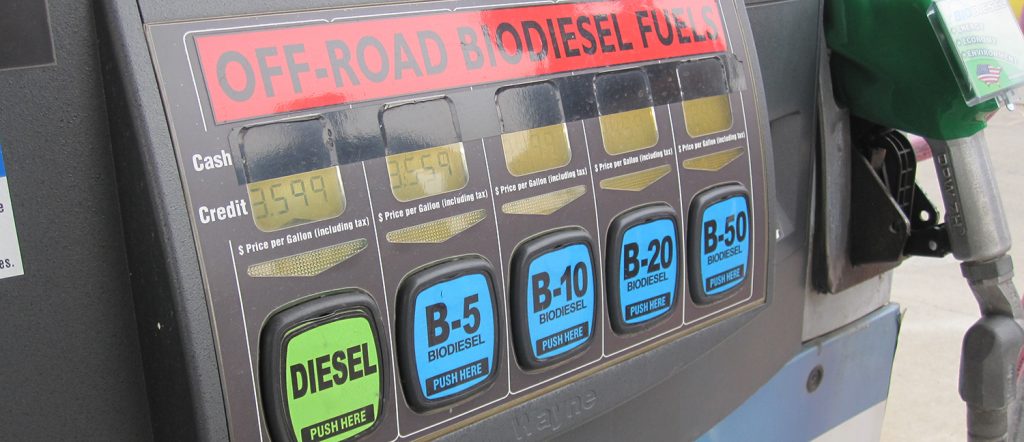Earlier this month, a couple of representatives of the Minnesota Ag Water Quality Certification Program traveled to the Skaug farm outside of Beltrami to present Mike and his son, Ryan, with a couple of signs signifying the farm’s compliance with the still relatively new statewide program passed by the Minnesota Legislature almost four years ago.
In achieving the designation as an official “Minnesota Water Quality Certified Farm,” Jim Lahn and Glen Kajewski of MAWQCP estimate that the Skaugs have joined a fraternity that to date likely comprises around 1 percent of Minnesota farm operations.

Lahn said efforts to certify compliant farmers began around 3 1/2 years ago with four pilot project areas in Minnesota. Around 18 months ago, the program went statewide, and to date approximately 535 operations like the Skaug farm have been certified, a total of around 300,000 acres.
The Skaug family farm dates back to 1886. Mike and Ryan farm around 4,200 acres in all and grow soybeans, corn and spring wheat.
Mike said that when he learned about the program and realized the benefits of being certified, he looked at his farm’s operation and realized that he and Ryan were already doing several of the things that MAWQCP desires, like the way they apply nutrients, how they manage tillage and carbon, utilizing runoff structures, crop protection and cover crops, etc.
“But I was a little apprehensive at first,” Mike said in his and Ryan’s farm shop. “I wanted to make sure that I could get certified and then stay certified. I tried some management things on my own and it took around 18 months to get to the point where it looked like it might be feasible to do this.”
It’s not easy, Kajewski acknowledged. Individual fields are assessed and scored, and they must score a minimum of 8.5 out of 10 to be judged compliant with MAWQCP. Farmers across the state have hit bumps in the road during their certification process in the form of field scores less than 8.5, and Mike said his process and some of his earlier field scores were no different.
“It’s detailed and comprehensive and it takes a lot of work,” Kajewski continued. “That’s why we think it’s important to recognize the efforts of farmers who successfully navigate this. It’s a pretty big deal.”
Once a farm operation is MAWQCP-certified, it lasts for 10 years, Lahn explained, with state officials checking back every now and then to make sure the farm is still doing what it needs to do to be recognized by the program.
In addition to being voluntary, the program is confidential as well, if farmers prefer it that way. The benefits beyond the official recognition include priority eligibility for funding via state and federal/USDA ag initiatives, and, perhaps most important, Lahn said, regulatory certainty. What that means is that if any new water-related regulations are enacted within the 10-year certification window, compliant farmers are automatically good to go. “We’re finding that’s big for farmers in this program,” Lahn noted.
Mike and Ryan are especially proud of their “split application” of nitrogen and other nutrients. “It’s really difficult to do, but we’re doing it,” Mike said.
Growers might be proud of what they’re doing as part of the MAWQCP program, but Kajewski said not every farmer who achieves certification wants to be recognized. He wishes that wasn’t the case, as he wants to shine a brighter spotlight on the benefits of the program, but Kajewski said he understands that’s simply how a lot of farmers are by nature.
“A lot of farmers don’t want everyone to know everything they’re doing,” he said. “They’re independent, they don’t want everything they do out there, so to speak, in front of folks. We respect that.”
But when farmers like Mike and Ryan Skaug are willing to have their conservation efforts publicly recognized, Lahn said he is more than happy to get the word out.
“We want to show that these people care about the land and the environment that produces these products that the world needs, and then, obviously, we hope it spurs other growers to sign up,” Lahn said.
Mike said he’s willing to be publicly recognized because he, too, wants to show that farmers overall want to be good stewards of the land. “We want to be productive growers, of course, but we want to be a friend to the land that produces our livelihood, and to consumers as well,” he said.






